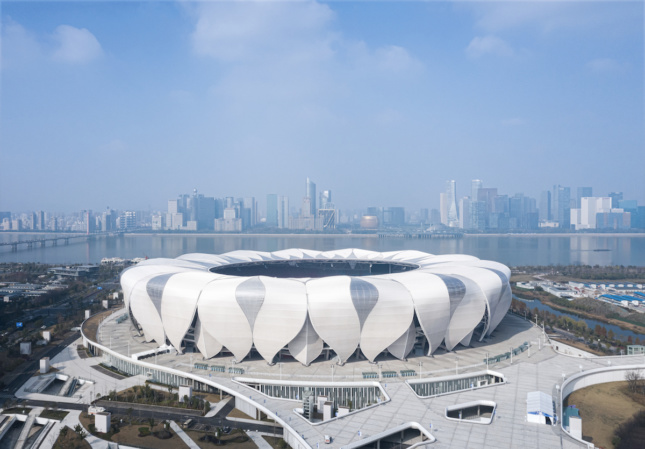
Visuals of Hangzhou, China’s, multipurpose sports center have finally been released ahead of the 2022 Asian Games. Located within China’s eastern Zhejiang province, the lotus petal-shaped structures were completed in 2018 and have hosted various events while undergoing additional interior upgrades, according to architects NBBJ.
Designed by NBBJ in partnership with CCDI, the center features two circular stadiums—one large and one small—set across a 4.3-million-square-foot site and a three-story platform. The main stadium, built to Olympic-size proportions, can hold up to 80,000 people for a variety of events including football and track and field. It’s connected to the nearby 10,000-seat tennis court via a ground-level plaza, gardens, and sunken courtyards, which cover an extensive network of underground retail, restaurants, and a cinema. From the platform and sports venues, visitors glean views of downtown Hangzhou’s Central Business District or the Qian Tang riverfront.
Construction update: 56 petals — 28 large and 28 small — come together to form the Hangzhou Olympic Sports Center, an Olympic-sized stadium that is nearly complete along the Qian Tang River. 🎥Terrence Zhang & Ryne Hill pic.twitter.com/kN3wBIPRm2
— NBBJ Design (@NBBJDesign) January 15, 2020
After breaking ground in 2011, the construction project experienced a few setbacks, including construction delays, and was supposed to be finished as late as 2015. The architect’s complex vision, created using generative parametric scripting, involved prefabricating the petal panels that encompass the stadia exterior in an effort to optimize the use of steel and reduce waste. NBBJ claimed that connecting the steel shell and the concrete bowl of the main stadium lowered the amount of steel framework as well. The 56 total petals used on-site act as trusses for the structures.
The Olympic Sports Center isn’t the only major development coming online for the 2022 Asian Games. Construction work just began on a net-zero sports park by Archi-Tectonics, !melk Landscape Design, and Thornton Tomasetti. The 116-acre development will include a table tennis stadium, a training facility, a shopping mall, and field hockey stadium linked via a series of parks and wetlands.